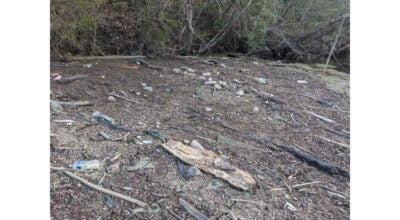Pass your forest forward
Published 12:35 pm Saturday, October 14, 2017
by Neil Clark
More than 10 million acres of Virginia’s woodlands belong to nearly 374,000 family forest owners, 51 percent of whom are 65 years of age or older. Some have owned their land for generations; others, only a few years. As they look ahead, many landowners want to keep their forestland intact and in the family, but they don’t know where to begin or how to engage the next generation of owners. The upcoming “Family Forest Landowner” workshop introduces concerned landowners to the options available to transfer their land and legacy to the next generation.
“Focusing on Forestland Transfer to Generation ‘NEXT’” is being offered on Thursday, Nov. 2 and 9 in the New Kent Forestry Center near Providence Forge, Virginia. This two-day program will help family forest landowners successfully plan the transfer of their woodlands, intact, from one generation to the next.
Current and future owners of family woodlands will learn family communication basics, estate planning tools and succession planning strategies to help sustain their family woodland legacy.
Speakers include legal and financial experts experienced in estate planning; forest landowners who have worked through succession planning, and natural resource professionals who work with landowners to conserve and manage land.
“Few challenges faced by Virginia’s family forest landowners are more important than the concern of passing the family land and carrying its stewardship forward to the next generation,” said Mike Santucci, assistant director of forestland conservation with the Virginia Department of Forestry. “Family forest landowners own their woodland for many reasons.
A consistent theme is that nearly all of them express a deep connection with their land and a desire to ‘do the right thing’ and leave a lasting legacy to their heirs.”
Acknowledging the hard decisions landowners can face in deciding to make a succession plan for their property, Adam Downing, extension forestry agent with Virginia Cooperative Extension’s Northern District region said, “Sometimes it’s difficult for landowners to consider — ‘What will happen to my forestland beyond my lifetime?’”
While many want to pass their forestland on to family members, only two percent to three percent have a plan in place to do so. Without a plan, landowners stand to lose more than just the property out of the family. They risk their family heritage and a portion of the wealth they have accumulated over the years.”
Santucci said, “We’re on the verge of a huge intergenerational land transfer of forestland in Virginia. The decisions made by family forest owners, including how they will pass their forestland forward to future generations, play a crucial role in maintaining a viable forestland base in Virginia.
These family woodlands are relied upon for not only the sustained flow of forest products, but for invaluable natural benefits, such as clean air and water, wildlife habitat and overall quality of life.”
Registration is now open through Tuesday, Oct. 24, for the next offering of this award-wining and practical short course. Past participants have reported significant planning progress; thousands of dollars of financial savings; and family engagement as a result of this investment.
The workshop is co-sponsored by Virginia Cooperative Extension and the VDOF, with support from the Virginia Department of Agriculture and Consumer Services, the Virginia Forest Landowner Education Program at Virginia Tech, Virginia Tree Farm Committee, The Black Family Land Trust.
For registration and more information, contact Neil Clark at southeast@vt.edu or 653-2572.
Neil Clark lives in Sedley and is the extension forester for eastern Virginia and interim extension agent for Southampton County. He can be reached at 653-2572 or southeast@vt.edu.





